
Narcissus is a genus of predominantly spring flowering perennial plants of the amaryllis family, Amaryllidaceae. Various common names including daffodil, narcissus and jonquil, are used to describe all or some members of the genus. Narcissus has conspicuous flowers with six petal-like tepals surmounted by a cup- or trumpet-shaped corona. The flowers are generally white and yellow, with either uniform or contrasting coloured tepals and corona.

Pulmonaria longifolia, is a semi-evergreen clump-forming herbaceous perennial plant, native to western Europe, including Britain, France, Spain, Portugal. It grows in semi-shaded habitats, such as woodland and scrub, to 2000 m above sea level.
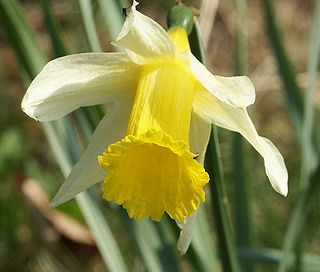
Narcissus pseudonarcissus, commonly named the wild daffodil or Lent lily, is a perennial flowering plant.
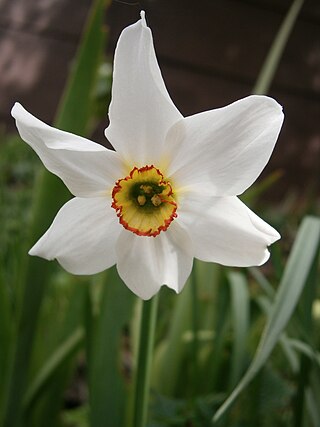
Narcissus poeticus, the poet's daffodil, poet's narcissus, nargis, pheasant's eye, findern flower or pinkster lily, was one of the first daffodils to be cultivated, and is frequently identified as the narcissus of ancient times. It is also often associated with the Greek legend of Narcissus. It is the type species of the genus Narcissus and is widely naturalised in North America.
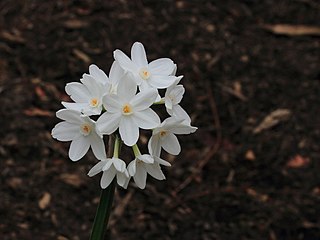
Narcissus papyraceus, one of a few species known as paperwhite, is a perennial bulbous plant native to the Mediterranean region, from Greece to Portugal plus Morocco and Algeria. The species is considered naturalized in the Azores, Corsica, Texas, California and Louisiana. The white flowers are borne in bunches and are strongly fragrant. It is frequently grown as a house plant, often forced to flower at Christmas.

Narcissus triandrus, also known as the Angel's Tears daffodil, is a species of flowering plant within the family Amaryllidaceae.

Narcissus bulbocodium, the petticoat daffodil or hoop-petticoat daffodil, is a species of flowering plant in the family Amaryllidaceae, native to southern and western France, Portugal, and Spain. Some sources say that the species is also native to Morocco, but this is based on populations formerly thought to be varieties of N. bulbocodium but now regarded as separate species.

Narcissus cyclamineus, the cyclamen-flowered daffodil, is a species of flowering plant in the family Amaryllidaceae, native to North West Portugal and North West Spain.
Alec Gray (1895-1986) was an English nurseryman and horticulturalist. He was notable as an authority on and breeder of daffodils, having developed over 100 new cultivars over a career spanning 60 years. In his free time he was also an enthusiastic archaeologist and poet.

Narcissus minor, the lesser daffodil or least daffodil, is a species of Narcissus within the family Amaryllidaceae. The species and its cultivar 'Little Gem' have both gained the Royal Horticultural Society's Award of Garden Merit.
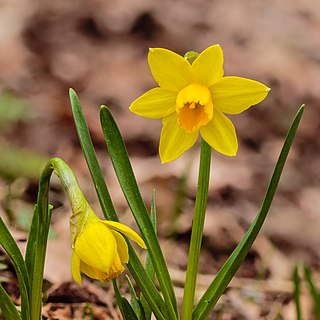
Narcissus 'Tête-à-tête' is a hybrid cultivar of Narcissus, which was introduced in 1949. It is one of 110 cultivars produced by British daffodil breeder Alec Gray. 'Tête-à-tête' is a popular ornamental plant, which is known for its very early flowering period and short stature. This cultivar is commonly used as a garden plant where it can be planted in pots, rock gardens, garden borders and even naturalized in lawns. The cultivar name 'Tête-à-tête' means to have a conversation between two people, which relates to the cultivar often hosting a pair of flowers per stem.

Narcissus 'Rip van Winkle' is an heirloom cultivar of Narcissus, which was first introduced commercially in 1884. When the cultivar was produced is unknown, however it is believed this historic cultivar originated in Irish gardens. The cultivar was first distributed by plantsman William Baylor Hartland of Country Cork, Ireland.

Narcissus 'King Alfred' is a cultivar of daffodil which originates in the county of Devon, United Kingdom. The cultivar is named after English king of the Anglo-Saxons, Alfred the Great.

Narcissus 'Grand Soleil d'Or' is a cultivar of daffodil. It is believed that the cultivar was derived from Narcissus tazetta.

Narcissus 'Gipsy Queen' is a hybrid cultivar of daffodil, which was registered in 1969. It is one of 110 cultivars produced by British daffodil breeder Alec Gray. This variety was produced by hybridizing Narcissus minor with Narcissus asturiensis.

Narcissus 'Sun Disc' is a hybrid cultivar of daffodil, which was introduced in 1949. It is one of 110 cultivars produced by British daffodil breeder Alec Gray. The cultivar was produced by hybridizing Narcissus rupicola with Narcissus poeticus.
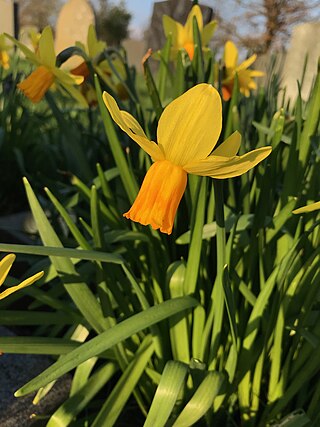
Narcissus 'Jetfire' is a cultivar of dwarf Narcissus, which was introduced in 1966. It is one of many cultivars produced by American daffodil breeder Grant E. Mitsch. 'Jetfire' is a popular early flowering ornamental plant utilized in gardens, where it can be planted into borders, flowerpots, and naturalized in lawns. The cultivar has received multiple awards, including the Award of Garden Merit from the Royal Horticultural Society.
















